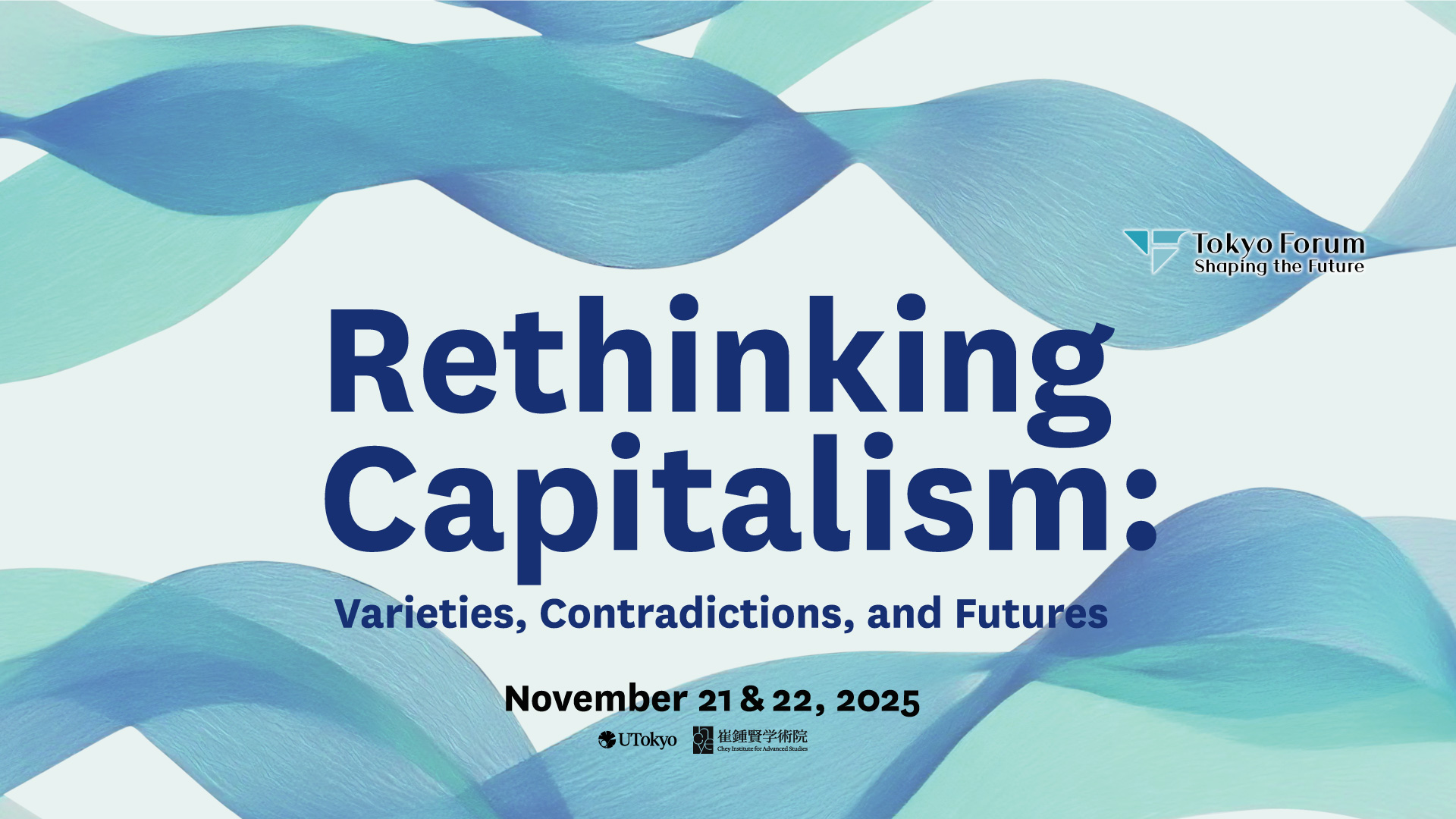Tokyo Forum 2025 "Rethinking Capitalism: Varieties, Contradictions, and Futures"

Details
| Type | Lecture |
|---|---|
| Intended for | General public / Enrolled students / International students / Alumni / Companies / High school students / University students / Academic and Administrative Staff |
| Date(s) | November 21, 2025 13:00 — November 22, 2025 18:30 |
| Location | Hongo Area Campus |
| Venue | Yasuda Auditorium |
| Capacity | 1000 people |
| Entrance Fee | No charge |
| Registration Method | Advance registration required
Please register in advance at the URL below. https://tokyoforum2025.peatix.com/ |
| Registration Period | September 1, 2025 — November 22, 2025 |
| Contact | tokyo.forum.adm(at)gs.mail.u-tokyo.ac.jp *Please replace (at) with @. |
Rethinking Capitalism: Varieties, Contradictions, and Futures
Tokyo Forum 2025 will explore capitalism and its internal tensions—between inclusivity and inequality, growth and sustainability, and creative destruction and social stability—amid an era of global uncertainty and transformation.
Since the fall of the Berlin Wall, capitalism has become the de facto global economic system. As it has expanded and adapted, scholars have continued to examine its impacts and underlying dynamics.
In Japan, thought leaders have introduced the concept of “collaborative capitalism,” which promotes shared benefits and cooperation among businesses, academia, citizens, and government. They emphasize that capitalism does not have to be solely about competition—it can also foster connection and care.
Science and academia are increasingly intertwined with capitalism. Once seen primarily as public goods, universities and research institutions now operate within market-driven systems—shaped by competitive funding, corporate partnerships, and commercialization. While these forces can drive innovation, expand research opportunities, and accelerate the application of knowledge to real-world challenges, they also raise concerns about academic freedom, inequality in knowledge access, reinforcement of existing differences and the sidelining of research that serves the public good. Nevertheless, science and higher education remain essential spaces for critical inquiry and for imagining futures beyond the logic of profit.
Japan and South Korea are important neighboring countries that should address common global challenges. Both countries have developed by building their societies on the foundations of capitalism. This year 2025 also marks the 60th anniversary of the normalization of diplomatic relations between them. This milestone provides a timely opportunity to reflect on the forms of capitalism that have shaped our world, and share their vision from the perspective of East Asia.
As we look ahead to Tokyo Forum 2025, the conversations around capitalism are more urgent and relevant than ever. By drawing from diverse perspectives—historical, economic, technological, and ethical—we are called not only to understand the systems that shape our world, but to imagine and build a more inclusive, sustainable, and cooperative future without giving up innovation and continued growth.
Please be sure to check out the official website for the latest program and speaker lineup!
Tokyo Forum 2025 will explore capitalism and its internal tensions—between inclusivity and inequality, growth and sustainability, and creative destruction and social stability—amid an era of global uncertainty and transformation.
Since the fall of the Berlin Wall, capitalism has become the de facto global economic system. As it has expanded and adapted, scholars have continued to examine its impacts and underlying dynamics.
In Japan, thought leaders have introduced the concept of “collaborative capitalism,” which promotes shared benefits and cooperation among businesses, academia, citizens, and government. They emphasize that capitalism does not have to be solely about competition—it can also foster connection and care.
Science and academia are increasingly intertwined with capitalism. Once seen primarily as public goods, universities and research institutions now operate within market-driven systems—shaped by competitive funding, corporate partnerships, and commercialization. While these forces can drive innovation, expand research opportunities, and accelerate the application of knowledge to real-world challenges, they also raise concerns about academic freedom, inequality in knowledge access, reinforcement of existing differences and the sidelining of research that serves the public good. Nevertheless, science and higher education remain essential spaces for critical inquiry and for imagining futures beyond the logic of profit.
Japan and South Korea are important neighboring countries that should address common global challenges. Both countries have developed by building their societies on the foundations of capitalism. This year 2025 also marks the 60th anniversary of the normalization of diplomatic relations between them. This milestone provides a timely opportunity to reflect on the forms of capitalism that have shaped our world, and share their vision from the perspective of East Asia.
As we look ahead to Tokyo Forum 2025, the conversations around capitalism are more urgent and relevant than ever. By drawing from diverse perspectives—historical, economic, technological, and ethical—we are called not only to understand the systems that shape our world, but to imagine and build a more inclusive, sustainable, and cooperative future without giving up innovation and continued growth.
Please be sure to check out the official website for the latest program and speaker lineup!






